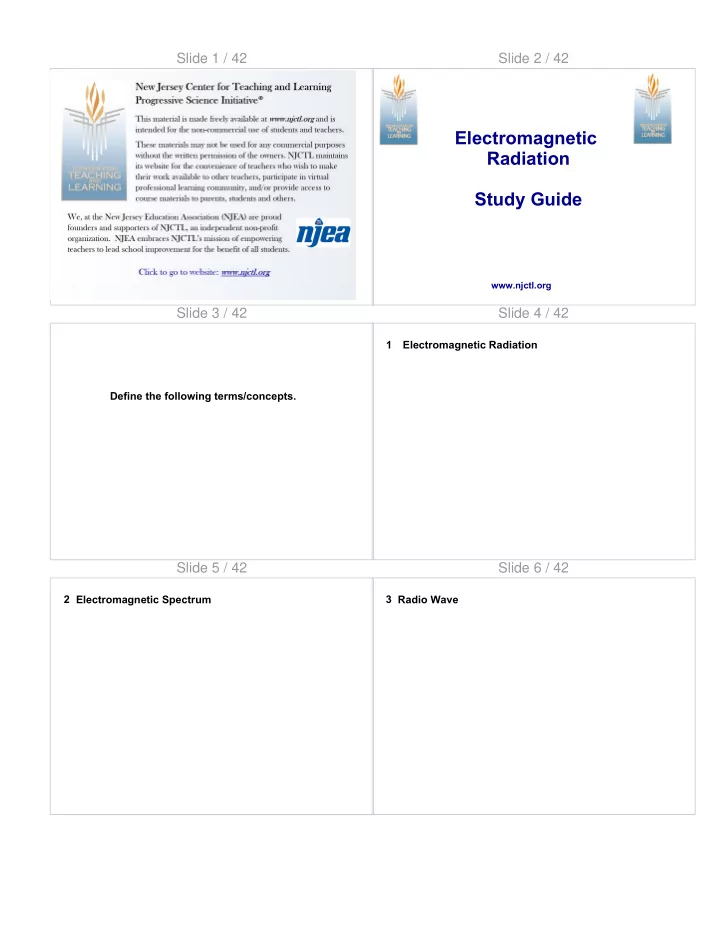

Slide 1 / 42 Slide 2 / 42 Electromagnetic Radiation Study Guide www.njctl.org Slide 3 / 42 Slide 4 / 42 1 Electromagnetic Radiation Define the following terms/concepts. Slide 5 / 42 Slide 6 / 42 2 Electromagnetic Spectrum 3 Radio Wave
Slide 7 / 42 Slide 8 / 42 4 Microwave 5 Radar Slide 9 / 42 Slide 10 / 42 6 Infrared Light 7 Visible Light Slide 11 / 42 Slide 12 / 42 8 Ultraviolet Radiation 9 X-Rays
Slide 13 / 42 Slide 14 / 42 10 Gamma Rays 11 Opaque object Slide 15 / 42 Slide 16 / 42 12 Transparent object 13 Reflection Slide 17 / 42 Slide 18 / 42 14 Absorption 15 Refraction
Slide 19 / 42 Slide 20 / 42 16 Electromagnetic Radiation is produced by: A the sun Directions: Select the answer choice that best completes the statement or answers the question. B light bulbs C nuclear reaction D all of the above Slide 21 / 42 Slide 22 / 42 18 Which of the following electromagnetic wavelengths would have the highest frequency? 17 As electromagnetic waves travel, they do not lose energy. A 100 m A True B 10 m B False C 1 m D 0.1 m Slide 23 / 42 Slide 24 / 42 19 Which of the following forms of electromagnetic 20 Radio waves have the longest wavelengths of all radiation has the shortest wavelength? electromagnetic waves. A True A Visible light B False B X-Ray C Microwaves D Radio Waves
Slide 25 / 42 Slide 26 / 42 21 How many primary colors are there in visible light? 22 The highest energy electromagnetic waves are: A 2 A radio waves B 3 B visible light waves C 4 C gamma rays D 5 D x-rays Slide 27 / 42 Slide 28 / 42 23 If an object hit by white light appears green, which of 24 When light travels from water to air, its speed: the following colors of light must be absorbed by the object? A increases B decreases A Red C stays the same B Orange C Yellow D All of the above Slide 29 / 42 Slide 30 / 42 25 Which of the following waves in the visible light spectrum bends the most when it is refracted? A Orange Directions: Answer the following thoroughly. B Yellow C Violet D Blue
Slide 31 / 42 Slide 32 / 42 26 How do electromagnetic waves differ from 27 An electromagnetic wave has a frequency of 2 mechanical waves? GHz (2,000,000,000 Hz). What is the wavelength of the wave? Slide 33 / 42 Slide 34 / 42 28 Red light has a frequency of 4.6 X 10 14 Hz 29 List the following electromagnetic waves in order (460,000,000,000,000 Hz). What is the wavelength of decreasing wavelength (increasing energy) – of red light? Gamma Rays, Microwaves, Radio Waves, Visible Light Waves, Ultraviolet Waves, X-Ray Waves, and Infrared Waves. Slide 35 / 42 Slide 36 / 42 30 Explain how a radio works, including its parts, as 31 Why is it impossible for human beings to see well as the difference between AM and FM radios. infrared and ultraviolet light?
Slide 37 / 42 Slide 38 / 42 32 Compare/Contrast UVA, UVB, and UVC rays. 33 Why are Gamma rays and X-Rays so dangerous to come into contact with? Slide 39 / 42 Slide 40 / 42 34 Explain how we perceive an object’s color. 35 How does a prism work? Slide 41 / 42 Slide 42 / 42 36 In relation to the “normal”, when light passes 37 How are X-Ray images captured? from air to water at an incident angle of 90 degrees, where will the light diffract to?
Recommend
More recommend